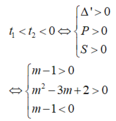cho pt x2 - 2mx + m2 + 3m - 4 = 0 (m là tham số) (1)
a) Tìm m để pt (1) có nghiệm
b) Tìm m để pt (1) có 2 nghiệm x1 ; x2 thỏa mãn : A = x12 + x22 đạt giá trị nhỏ nhất
Hãy nhập câu hỏi của bạn vào đây, nếu là tài khoản VIP, bạn sẽ được ưu tiên trả lời.

a,phương trình có nghiệm
`<=>\Delta>=0`
`<=>4m^2-4(m^2-m+2)>=0`
`<=>4m^2-4m^2+4m-8>=0`
`<=>4m>=8`
`<=>m>=2`
b,Áp dụng định lý vi-ét ta có:
`x_1+x_2=-b/a=2m`
`x_1.x_2=c/a=-m^2-m+2`

Δ=(-2m)^2-4(m^2-m)
=4m^2-4m^2+4m=4m
Để (1) có 2 nghiệm phân biệt thì 4m>0
=>m>0
x1^2+x2^2=4-3x1x2
=>(x1+x2)^2-2x1x2=4-3x1x2
=>(2m)^2+m^2-m=4
=>4m^2+m^2-m-4=0
=>5m^2-m-4=0
=>5m^2-5m+4m-4=0
=>(m-1)(5m+4)=0
=>m=1 hoặc m=-4/5(loại)

Chọn C
Đặt t= x-1 hay x= t+1, thay vào pt đã cho ta được pt:
t2+ 2(1-m) t+ m2- 3 m+2= 0 (2)
pt (1) có 2 nghiệm thỏa mãn x1< 1< x2 khi và chỉ khi pt (2) có 2 nghiệm: t1< 0 < t2 suy ra P < 0
Hay m2- 3m+ 2 < 0
Do đó: 1 < m < 2
Kết luận: với 1< m< 2 thì pt (1) có hai nghiệm x1< 1< x2

Chọn D
Đặt t= x-1 hay x= t+1, thay vào pt đã cho ta được pt:
t2+ 2(1-m) t+ m2- 3 m+2= 0 (2)
pt (1) có 2 nghiệm thỏa x1< x2< 1 khi và chỉ khi pt (2) có 2 nghiệm:

(vô nghiệm)
Kết luận: không tồn tại m thỏa mãn bài toán.

Bài 1:
a, Thay m=-1 vào (1) ta có:
\(x^2-2\left(-1+1\right)x+\left(-1\right)^2+7=0\\
\Leftrightarrow x^2+1+7=0\\
\Leftrightarrow x^2+8=0\left(vô.lí\right)\)
Thay m=3 vào (1) ta có:
\(x^2-2\left(3+1\right)x+3^2+7=0\\ \Leftrightarrow x^2-2.4x+9+7=0\\ \Leftrightarrow x^2-8x+16=0\\ \Leftrightarrow\left(x-4\right)^2=0\\ \Leftrightarrow x-4=0\\ \Leftrightarrow x=4\)
b, Thay x=4 vào (1) ta có:
\(4^2-2\left(m+1\right).4+m^2+7=0\\ \Leftrightarrow16-8\left(m+1\right)+m^2+7=0\\ \Leftrightarrow m^2+23-8m-8=0\\ \Leftrightarrow m^2-8m+15=0\\ \Leftrightarrow\left(m^2-3m\right)-\left(5m-15\right)=0\\ \Leftrightarrow m\left(m-3\right)-5\left(m-3\right)=0\\ \Leftrightarrow\left(m-3\right)\left(m-5\right)=0\\ \Leftrightarrow\left[{}\begin{matrix}m=3\\m=5\end{matrix}\right.\)
c, \(\Delta'=\left[-\left(m+1\right)\right]^2-\left(m^2+7\right)=m^2+2m+1-m^2-7=2m-6\)
Để pt có 2 nghiệm thì \(\Delta'\ge0\Leftrightarrow2m-6\ge0\Leftrightarrow m\ge3\)
Theo Vi-ét:\(\left\{{}\begin{matrix}x_1+x_2=2m+2\\x_1x_2=m^2+7\end{matrix}\right.\)
\(x_1^2+x_2^2=0\\ \Leftrightarrow\left(x_1+x_2\right)^2-2x_1x_2=0\\ \Leftrightarrow\left(2m+2\right)^2-2\left(m^2+7\right)=0\\ \Leftrightarrow4m^2+8m+4-2m^2-14=0\\ \Leftrightarrow2m^2+8m-10=0\\ \Leftrightarrow\left[{}\begin{matrix}m=1\left(ktm\right)\\m=-5\left(ktm\right)\end{matrix}\right.\)
\(x_1-x_2=0\\ \Leftrightarrow\left(x_1-x_2\right)^2=0\\ \Leftrightarrow\left(x_1+x_2\right)^2-4x_1x_2=0\\ \Leftrightarrow\left(2m+2\right)^2-4\left(m^2+7\right)=0\\ \Leftrightarrow4m^2+8m+4-4m^2-28=0\\ \Leftrightarrow8m=28=0\\ \Leftrightarrow m=\dfrac{7}{2}\left(tm\right)\)
Bài 2:
a,Thay m=-2 vào (1) ta có:
\(x^2-2x-\left(-2\right)^2-4=0\\ \Leftrightarrow x^2-2x-4-4=0\\ \Leftrightarrow x^2-2x-8=0\\ \Leftrightarrow\left[{}\begin{matrix}x=4\\x=-2\end{matrix}\right.\)
b, \(\Delta'=\left(-m\right)^2-\left(-m^2-4\right)\ge0=m^2+m^2+4=2m^2+4>0\)
Suy ra pt luôn có 2 nghiệm phân biệt
Theo Vi-ét:\(\left\{{}\begin{matrix}x_1+x_2=2\\x_1x_2=-m^2-4\end{matrix}\right.\)
\(x_1^2+x_2^2=20\\ \Leftrightarrow\left(x_1+x_2\right)^2-2x_1x_2=20\\ \Leftrightarrow2^2-2\left(-m^2-4\right)=20\\ \Leftrightarrow4+2m^2+8-20=0\\ \Leftrightarrow2m^2-8=0\\ \Leftrightarrow m=\pm2\)
\(x_1^3+x_2^3=56\\ \Leftrightarrow\left(x_1+x_2\right)^3-3x_1x_2\left(x_1+x_2\right)=56\\ \Leftrightarrow2^3-3\left(-m^2-4\right).2=56\\ \Leftrightarrow8-6\left(-m^2-4\right)-56\\ =0\\ \Leftrightarrow8+6m^2+24-56=0\\ \Leftrightarrow6m^2-24=0\\ \Leftrightarrow m=\pm2\)
\(x_1-x_2=10\\ \Leftrightarrow\left(x_1-x_2\right)^2=100\\ \Leftrightarrow\left(x_1+x_2\right)^2-4x_1x_2-100=0\\ \Leftrightarrow2^2-4\left(-m^2-4\right)-100=0\\ \Leftrightarrow4+4m^2+16-100=0\\ \Leftrightarrow4m^2-80=0\\ \Leftrightarrow m=\pm2\sqrt{5}\)

1.Ta có \(\Delta=4m^2-4\left(m^2-m-3\right)=4m+12\)
Để phương trình có 2 nghiệm phân biệt \(\Rightarrow\Delta>0\Rightarrow4m+12>0\Rightarrow m>-3\)
Theo hệ thức Viet ta có \(\hept{\begin{cases}x_1+x_2=2m\\x_1.x_2=m^2-m-3\end{cases}}\)
a. Phương trình có 2 nghiệm trái dấu \(\Rightarrow x_1.x_2< 0\Rightarrow m^2-m-3< 0\Rightarrow\frac{1-\sqrt{13}}{2}< m< \frac{1+\sqrt{13}}{2}\)
Vậy \(\frac{1-\sqrt{13}}{2}< m< \frac{1+\sqrt{13}}{2}\)
b. Phương trình có 2 nghiệm phân biệt dương \(\Leftrightarrow\hept{\begin{cases}x_1+x_2=2m>0\\x_1.x_2=m^2-m-3>0\end{cases}\Leftrightarrow\hept{\begin{cases}m>0\\m< \frac{1-\sqrt{13}}{2}\end{cases}\left(l\right);\hept{\begin{cases}m>0\\m>\frac{1+\sqrt{13}}{2}\end{cases}\Leftrightarrow m>\frac{1+\sqrt{13}}{2}}}}\)
Vậy \(m>\frac{1+\sqrt{13}}{2}\)
2. a.Ta có \(\Delta=\left(2m-1\right)^2+4m=4m^2-4m+1+4m=4m^2+1\)
Ta thấy \(\Delta=4m^2+1>0\forall m\)
Vậy phương trình luôn có 2 nghiejm phân biệt với mọi m
b. Theo hệ thức Viet ta có \(\hept{\begin{cases}x_1+x_2=1-2m\\x_1.x_2=-m\end{cases}}\)
Để \(x_1-x_2=1\Leftrightarrow\left(x_1-x_2\right)^2=1\Leftrightarrow\left(x_1+x2\right)^2-4x_1x_2=1\)
\(\Leftrightarrow\left(1-2m\right)^2-4.\left(-m\right)=1\Leftrightarrow4m^2-4m+1+4m=1\)
\(\Leftrightarrow m^2=0\Leftrightarrow m=0\)
Vậy \(m=0\)thoă mãn yêu cầu bài toán

Phương trình có 2 nghiệm phân biệt khi và chỉ khi:
\(\Delta'=m^2-\left(m^2-m+1\right)>0\)
\(\Leftrightarrow m-1>0\)
\(\Rightarrow m>1\)
A,pt có 2 no pb
`<=>Delta>0`
`<=>4m^2-4(m^2-m+1)>0`
`<=>4(m-1)>0`
`<=>m-1>0`
`<=>m>1`

\(\Delta'=\left(m+1\right)^2-\left(m^2+3m-2\right)=-m+3\)
a. Phương trình có nghiệm khi:
\(\Delta'\ge0\Rightarrow m\le3\)
b. Theo hệ thức Viet: \(\left\{{}\begin{matrix}x_1+x_2=2\left(m+1\right)\\x_1x_2=m^2+3m-2\end{matrix}\right.\)
c.
\(x_1^2+x_2^2-x_1x_2=22\)
\(\Leftrightarrow\left(x_1+x_2\right)^2-3x_1x_2=22\)
\(\Leftrightarrow4\left(m+1\right)^2-3\left(m^2+3m-2\right)=22\)
\(\Leftrightarrow m^2-m-12=0\Rightarrow\left[{}\begin{matrix}m=4\left(loại\right)\\m=-3\end{matrix}\right.\)

a,để pt có nghiệm kép
\(\Delta=m^2-\left(m^2-m+1\right)=m-1=0\Leftrightarrow m=1\)
\(x_1=x_2=\dfrac{2m}{2}=m=1\)
b, để pt có nghiệm \(m\ge1\)
c, Ta có \(\left(x_1+x_2\right)^2-4x_1x_2=6\)
Thay vào ta đc \(4m^2-4\left(m^2-m+1\right)=6\)
\(\Leftrightarrow4m=10\Leftrightarrow m=\dfrac{5}{2}\left(tm\right)\)

1) Thay m=1 vào phương trình, ta được:
\(x^2-2x+1=0\)
\(\Leftrightarrow\left(x-1\right)^2=0\)
\(\Leftrightarrow x-1=0\)
hay x=1
Vậy: Khi m=1 thì phương trình có nghiệm duy nhất là x=1
1) Bạn tự làm
2) Ta có: \(\Delta'=\left(m-1\right)^2\ge0\)
\(\Rightarrow\) Phương trình luôn có 2 nghiệm
Theo Vi-ét, ta có: \(\left\{{}\begin{matrix}x_1+x_2=2m\\x_1x_2=2m-1\end{matrix}\right.\)
a) Ta có: \(x_1+x_2=-1\) \(\Rightarrow2m=-1\) \(\Leftrightarrow m=-\dfrac{1}{2}\)
Vậy ...
b) Ta có: \(x_1^2+x_2^2=13\) \(\Rightarrow\left(x_1+x_2\right)^2-2x_1x_2=13\)
\(\Rightarrow4m^2-4m-11=0\) \(\Leftrightarrow m=\dfrac{1\pm\sqrt{13}}{2}\)
Vậy ...